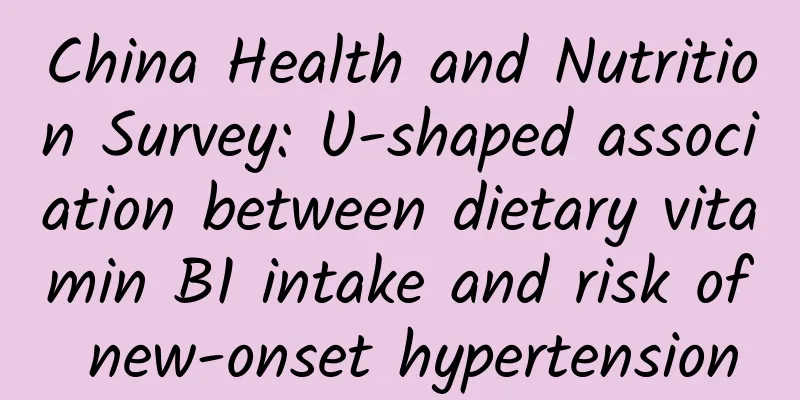China Health and Nutrition Survey: U-shaped association between dietary vitamin B1 intake and risk of new-onset hypertension

|
Vitamin B1 (thiamine) is a water-soluble vitamin that plays an important role in energy metabolism, anti-inflammation, and protection of endothelial function. Animal experiments have shown that vitamin B1 supplementation can lower the blood pressure of hypertensive rats. However, there has been no large-sample population cohort study exploring the relationship between dietary vitamin B1 intake and new-onset hypertension. A recent research paper published in the biomedical journal Nutrients found for the first time that the relationship between dietary vitamin B1 intake and the risk of new-onset hypertension is a U-shaped relationship , with the lowest risk of new-onset hypertension when the intake range is 0.76–1.13 mg/day . Professor Qin Xianhui from the National Clinical Research Center for Kidney Diseases of Nanfang Hospital and Liu Chengzhang from the School of Public Health of Anhui Medical University are the corresponding authors, and Dr. Zhang Yuanyuan is the first author. The study is a prospective cohort study based on data from the China Health and Nutrition Survey, which included 12,177 Chinese adults without baseline hypertension. Dietary vitamin B1 intake data were collected through 24-hour dietary recall and household food inventory for 3 consecutive days, and the cumulative mean of vitamin B1 intake represented its long-term exposure level. The average age of the population was 41.2 years old, and the median intake of dietary vitamin B1 was 0.93 mg/day. After 6.1 years of follow-up, 4,269 participants developed hypertension. The results showed that dietary vitamin B1 intake was associated with new-onset hypertension in a U-shaped manner . Compared with dietary thiamine intake in the 25%-75% quantile ( 0.76-1.13 mg/day ), the risk of new-onset hypertension in people with intakes below the 25% quantile and above the 75% quantile increased by 25% and 36%, respectively. The researchers pointed out that hypertension is a major public health problem worldwide and one of the main risk factors for cardiovascular disease. Therefore, it is of great clinical significance to identify more modifiable risk factors related to hypertension and promote the primary prevention of hypertension. The results of this study emphasize the importance of maintaining an appropriate level of vitamin B1 intake for the primary prevention of hypertension in the Chinese population . References: Zhang Y, Zhang Y, Yang S, Ye Z, Wu Q, Liu M, Zhou C, He P, Jiang J, Liang M, Wang G, Hou F, Liu C, Qin X. U-Shaped Relation of Dietary Thiamine Intake and New-Onset Hypertension. Nutrients . 2022 Aug 9;14(16):3251 Editor: Zhang Yuanyuan and Xiang Hao Reviewer: Qin Xianhui Reprint: Please contact us and indicate the source. |
>>: The barbecue season is coming, please keep this "healthy barbecue" guide
Recommend
Where does a woman's menstruation come from?
There are many women in our lives who are particu...
What are the causes of waist and abdominal obesity in women?
Everyone's obesity situation is different. In...
Pathology Science: Why is there a black line on my nail?
"Doctor, why is there a black stripe on my n...
Can I use a fan during early pregnancy?
Summer is a very hot environment, and pregnant wo...
Will multiple abortions lead to cervical erosion?
Usually, many reasons may cause cervical erosion ...
Can pregnant women eat seaweed?
A woman's body undergoes significant changes ...
There is blood in my lower body and it doesn't feel like menstruation and it doesn't hurt. What's going on?
Bleeding from the female genitals will not only c...
What is normal blood sugar during pregnancy?
Regardless of whether they suffer from gestationa...
Is it good for women to have an IUD?
The insertion of an IUD is a reasonable contracep...
World No Tobacco Day丨Secondhand smoke, the harm is all around us!
Do you feel shocked when you see this poster? Smo...
Menopausal depression syndrome
Many patients cannot bear the mental blow during ...
Causes of brown discharge during non-menstrual period
We know that female friends sometimes have some b...
Can I take a urine test during my period?
Menstruation is a special period. During menstrua...
Can I eat bird's nest during menstruation?
Women are more vulnerable during menstruation. At...
What to do if your period is delayed due to anger
Many female friends will encounter the problem of...









